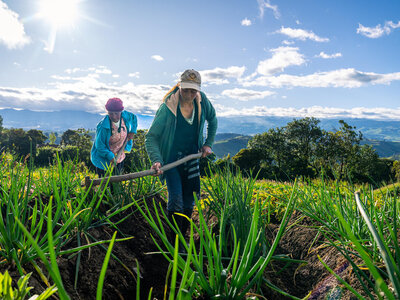Ecuador
- 43.2%
- of the rural population lives below the poverty line
- 67%
- of women are involved in rural family farming
- 17.9 million
- population
As an upper-middle income country, Ecuador is experiencing a reduction in financing from donor countries.
Both the World Food Programme (WFP) and partners face multiple challenges in securing funds for the country's social protection system – which is crucial given the socioeconomic difficulties caused by migration and the impact of multiple social, climate and security crises.
Despite Ecuador demonstrating resilience in its economic recovery following the COVID-19 pandemic, growth has stagnated. Over a quarter of the population was living in poverty in mid 2024, while extreme poverty reached 10.6 percent. This situation is exacerbated by high levels of insecurity and political uncertainty.
Ecuador faces a complex migration situation, marked by both the continuous influx of migrants and an increase in emigration. In March 2024, the Working Group for Refugees and Migrants estimated that there were almost half a million Venezuelan migrants in Ecuador. Of these, more than 245,000 experience food insecurity, with over 45,000 suffering from severe food insecurity.
The country's vulnerability to the consequences of the climate crisis threatens the sustainability of food systems and could worsen malnutrition and poverty.
WFP focuses on four key areas: ensuring access to food; eradicating malnutrition; promoting adaptation to climate change and sustainable food systems; and providing goods and services. With these priorities, we aim to address challenges in the 23 provinces where we operate, with the invaluable support of our partners and donors.
What the World Food Programme is doing in Ecuador
-
Food assistance and nutrition
-
We provide vital food assistance to more than 320,000 refugees, migrants and Ecuadorians suffering from severe food insecurity. We use cash transfers and vouchers to reach vulnerable people, covering both border areas and urban centres, as well as remote regions with high levels of malnutrition and poverty. Additionally, WFP raises awareness of proper food and nutrition, prioritizing pregnant or breastfeeding women and children up to 5 years old.
-
Ending malnutrition
-
Climate change adaptation and sustainable food systems
-
Capacity strengthening
-
Emergency preparedness and response
-
Service provision
Ecuador news releases
Go to pagePartners and donors
Find out more about the state of food security in Ecuador
Visit the food security analysis pageOperations in Ecuador
Contacts
Office
Avenida Mariana de Jesús Oe7-02 y Nuño de Valderrama. Edificio Citimed. Piso 8
Quito
Ecuador







